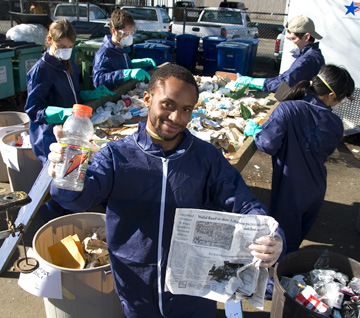Volume 25 · Number 3 · Spring 2008
Dirty Work and Dream Jobs: Terry Singleton

(Photo: Karin Higgins/UC Davis)
Sophomore undeclared major from San Diego
Job: team leader for R4’s Assessment and Waste Audits Project
UC Davis reuses, recycles and composts more than half of its trash — 56 percent to be exact — doing a better job of it than any other campus in the UC system. Credit for that goes in large part to people like Terry Singleton who has a passion for the environment and a job to persuade people to clean up their wasteful ways. Singleton assesses new buildings and makes recommendations about the placement and type of recycling bins. For older buildings, he conducts “audits” — meaning he gets elbow-deep in their trash to see just how well the occupants keep recycling in mind. He then gives presentations to the faculty and staff who work in the buildings to let them know what he’s found and to do, as he puts it, “some education and some promotion.”
The ick factor: Singleton dons overalls, gloves, goggles and mask before he begins to sort through trash, and he’s learned not to let a bag sit and ripen over the weekend. But, he says of the dirty work, “I really don’t mind — it doesn’t bother me much.” What does bother him are people who are too lazy to recycle. “I’m surprised at the things that people will do not to recycle,” he says. “If the bin is in another room, if it’s not right next to them, they won’t recycle.” That’s an attitude he tries to change through his presentations — a role that he recognizes puts him in the position of teaching his teachers. “It’s exciting,” he says, “but intimidating.”
The job ahead: With a campus goal of zero waste generation by the year 2020, Singleton and his R4 colleagues have a challenge ahead. But strides are being made. Case in point: the new Aggie Stadium is the first in the nation to adopt a zero waste policy, selling only those concession items that can be recycled or composted. Long term, Singleton knows that of the four Rs — reducing waste, reusing items, recycling materials and rebuying recycled products — rebuying is key. “Recycling is economically based, and it’s all run by the demand,” he says. “Even if people want to recycle, if there is no demand for recycled materials, there will be no recycling going on.” So he also works to encourage people to use recycled materials and has even considered a career in the policymaking end of environmentalism: “I want to make sure that my work doesn’t go to waste.”
« Back to Dirty Work and Dream Jobs
